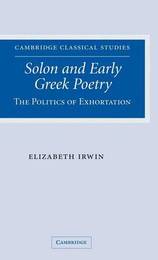
|
Solon and Early Greek Poetry: The Politics of Exhortation
Hardback
Main Details
Description
The poetry of archaic Greece gives voice to the history and politics of the culture of that age. This book examines the interaction between poetics and politics in the archaic period, with particular attention being paid to the work of Solon. It explores the types of history that have been, and can be, written from archaic Greek elegy, and the role poetry had in articulating social realities and ideologies. The book argues that, in general, the political expressions of martial exhortation elegy were aristocratic in nature and that the symposiasts attempted to assert a heroic identity on the wider polis community. The remainder of the study demonstrates how Solon's poetry subverts this practice, using the poetic traditions of epic and Hesiod to further different political aims. It concludes by looking outside the confines of Solon's poetic appropriations to argue for other influences on his poetry, in particular that of tyranny.
Author Biography
Elizabeth Irwin is Research Fellow at Girton College Cambridge. She is the author of articles on Greek literature and a contributor to The Hesiodic Catalogue of Women (editor Richard Hunter) (Cambridge, forthcoming).
Reviews'It is simply superb scholarship, impressively documented and combining to a rare degree both literary and historical/political aspects ... To reveal all the many virtues of this splendid book would require a multi-page review. It must suffice to say that not only is Irwin's book important for understanding some of Solon's poetry and the political and social conditions in Athens during his lifetime, but also for much earlier poetry, especially Homer (with particular emphasis on the Odyssey), Hesiod and Tyrtaeus.' The Classical Review
|